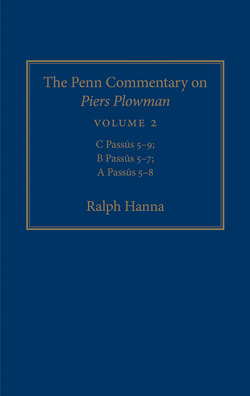The Penn Commentary on Piers Plowman, Volume 2

Реклама. ООО «ЛитРес», ИНН: 7719571260.
Оглавление
Ralph Hanna. The Penn Commentary on Piers Plowman, Volume 2
Отрывок из книги
The Penn Commentary on Piers Plowman Volume 2
VOLUME 2
.....
clemencia non constringit, given the preceding tag “And elsewhere (it is written),” presumably also cites a text, but one I have failed to identify; one should probably read constringitur. Pearsall aptly associates the statement “Clemency is not constrained” with Portia’s “The quality of mercy is not strained” (Shakespeare, Merchant of Venice 4.1.179). However, the valences of Portia’s claim and that here are not quite similar. One should compare two standard definitions of the virtue Clemency (a “part” of the cardinal virtue Temperance) widely cited in the Middle Ages, Cicero, De inventione 2.54.164; and Seneca, De clementia 2.3, the latter of which reads: “Clementia est … lenitas superioris adversus inferiorem in constituendis poenis” (Clemency is a superior’s lenience in inflicting punishment on an inferior). Clemency “is not constrained,” because it voluntarily avoids what is constrained, the proper penalty assigned to a criminous action. Equally, by its nature, it is the virtue of a noble man, a superior or eyre, who displays meekness, not a desire to impose punishment. See further Seneca’s discussion, De clementia 1.7.1–5. The remark is obviously double-edged: Will directs Reason’s attention to his potential lack of clemency, while claiming his own pure intentions.
The two criteria Will invokes are of different degrees of plausibility. On the one hand, Gratian is clear that slaves, unless freed by their lord from servitude, are debarred from ordination (Decretum 1.54; CJC 1:206–14). But the discussion of whether a priest’s child, and by extension any product of an unsanctified union, may be ordained (Decretum 1.56; CJC 1:219–23) offers a range of views. These include a series of attacks on the proposition that parental sin descends to the offspring, and the authors generally would allow ordination on a showing of the candidate’s virtuous merits (succinctly Jerome in c. 8). These discussions may come as some surprise to proponents of genetic predestinarianism elsewhere in the poem, notably Holychurch at 2.24–42 and Wit at 10.203–35. (The latter, in the form of B 9.121–57, as Justice 1994:105–11 points out, is a plausible source for John Ball’s views; note the subsequent 236–55, unique to C.)
.....